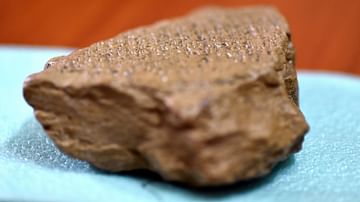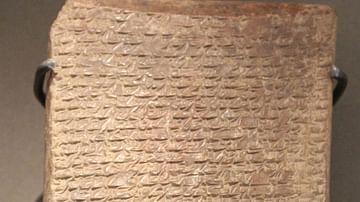Search
Search Results

Article
The Newly Discovered Tablet II of the Epic of Gilgamesh
Surpassing all other kings, heroic in stature, brave scion of Uruk, wild bull on the rampage! Going at the fore he was the vanguard, going at the rear, one his comrades could trust! (Prologue, Tablet I, The Epic of Gilgamesh...

Article
Lenin's New Economic Policy - Communism's Flirtation with Capitalism
The New Economic Policy (NEP) of Vladimir Lenin (1870-1924), leader of Soviet Russia, was the introduction in 1921 of a limited form of capitalism in light industry and agriculture. Contrary to Marxist economic ideas, the NEP was viewed as...

Definition
Pazuzu
Pazuzu is an Assyrian/Babylonian demonic god who was most popular in the first millenium BCE. He was the son of Hanbi (also Hanba), king of the demons of the underworld, and brother to Humbaba, the demon-god protector of the Cedar Forest...

Definition
Kingdom of Israel
The Kingdom of Israel occupied that part of the land on the Mediterranean Sea known as the Levant which corresponds roughly to the State of Israel of modern times. The region was known, historically, as part of Canaan, as Phoenicia, as Palestine...

Definition
Continental System
The Continental System was a major blockade of British trade imposed by French Emperor Napoleon I from 21 November 1806 to 11 April 1814. It was designed to cripple the British economy, thereby forcing Britain out of the Napoleonic Wars (1803-1815...

Article
Ludlul-Bel-Nemeqi
The Ludlul-Bel-Nemeqi (c. 1700 BCE) is a Sumerian and later Babylonian poem on the theme of unjust suffering, which is thought to have influenced the biblical Book of Job. Also known as The Poem of the Righteous Sufferer, the title translates...

Definition
Gilgamesh
Gilgamesh is the semi-mythic King of Uruk best known as the hero of The Epic of Gilgamesh (c. 2150-1400 BCE) the great Babylonian poem that predates Homer's Iliad and Odyssey by 1500 years and, therefore, stands as the oldest piece of epic...

Definition
Marduk
Marduk was the patron god of Babylon who presided over justice, compassion, healing, regeneration, magic, and fairness, although he is also sometimes referenced as a storm god and agricultural deity. His temple, the famous ziggurat described...

Definition
Library of Ashurbanipal
The Library of Ashurbanipal (7th century BCE) is the oldest known systematically organized library in the world, established in Nineveh by the Neo-Assyrian king Ashurbanipal (r. 668-627 BCE) to preserve the history and culture of Mesopotamia...

Definition
Sumerian Language
The Sumerian language was spoken in southern Mesopotamia before the 2nd millennium BCE and was the first language to be written in the cuneiform script. It is an isolate language meaning we know of no other languages that relate to it ancestrally...